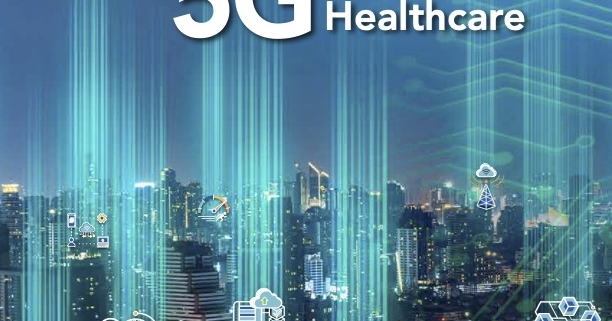MDIC’s new report surveys the role of 5G connectivity in current and future states of the healthcare continuum of care. The report highlights key challenges and knowledge gaps to help deliver the benefits of 5G in healthcare more safely to patients.
ARLINGTON, Va. – The Medical Device Innovation Consortium (MDIC), has released the Landscape Analysis of 5G in Healthcare report. This report, accompanied by a one-page overview on 5G Security Enhancements, details the role of 5G connectivity in the future state of medical devices utilizing the technology that will contribute to the continuity of care.
The report developed by MDIC’s 5G–Enabled Health Technologies Working Group highlights key challenges and knowledge gaps to deliver the benefits of 5G in healthcare more safely to patients. This report was championed by MDIC 5G Working Group members Dr. Omar Al-Kalaa, PhD, Staff Fellow FDA; Inhel Rekik, MS, CISM, Sr. Director, Product Security, Bracco Medical Technologies; and Mark Wehde, Chair, Mayo Clinic Engineering, Mayo Clinic, with contributions from experts in the sector.
The MDIC 5G–Enabled Health Technologies Working Group is comprised of leading experts from the FDA, United States Department of Veterans Affairs, academia, medical device industry, telecommunications sector, standards development organizations, and chipset and network equipment manufacturers. For this report, they convened to develop a better understanding of how 5G can improve patient safety across the entire continuum of care – from prevention through diagnosis, treatment, post-treatment monitoring, and beyond.
Key topics covered in the report include:
- 5G-enabled simulation with extended reality (XR)
- 5G-enabled robotics, remote surgical robots
- Mobile units, remote care, and telemedicine
- Supply chain and cost
- Network coverage
- Ongoing QoS monitoring
- Communication Key Performance Indicators (KPIs)
- Lack of evaluation methods for device functions enabled by 5G
- Roles, responsibilities and service level agreements
- Electromagnetic environment and wireless coexistence
- 5G cybersecurity and privacy considerations.
“MDIC convened over 150 global subject matter experts from various stakeholder groups to establish the common understandings of the technical and operational requirements for
5G-enabled devices, which in turn contribute to the safety and effectiveness of the device as well as accelerating patient access to this technology,” said Jithesh Veetil, PhD, Senior Program Director, Digital Health & Technology, MDIC.
Advances in wireless technologies can contribute to continued technical advancements in healthcare delivery. In this rapidly evolving environment, technology moves quickly, especially with a healthcare model moving to more remote, virtual care of patients. 5G plays a significant role in this care evolution.
“It was a truly rewarding experience to work with subject matter experts from around the globe through MDIC on the 5G landscape analysis. 5G technology will enable advanced home healthcare as well as allow hospitals including those in rural areas to provide cutting edge procedures and therefore narrowing health disparities among less favored communities while allowing them access to their highest level of care,” said Inhel Rekik.
“5G in healthcare advancements are accelerating device innovation and will allow us to treat, diagnose, and track patient health anywhere the patient is. Health management solutions that aren’t tied to a physical location such as a hospital, clinic, or home will fundamentally change how we provide healthcare, who provides healthcare, and most importantly, it will democratize who has access to healthcare. The two publications from MDIC will be excellent resources for anyone interested to learn more about 5G in healthcare,” said Mark Wehde.
In addition to Landscape Analysis of 5G in Healthcare and MDIC 5G Working Group released “5G Communication in Healthcare: Background, Landscape, and Use Cases Webinar” in August 2022. A collection of MDIC resources across the total product lifecycle of medical devices that highlights the dynamic and evolving technology advancements in healthcare is available in the online Resource Library.
About MDIC
The Medical Device Innovation Consortium (MDIC) is a public-private partnership that brings together representatives of the FDA, NIH, CMS, NIST, and other agencies, industry, non-profits, and patient advocacy organizations to improve the processes for development, assessment, and review of new medical technologies.
MDIC coordinates the development of methods, tools, and resources used in managing the total product life cycle of a medical device to improve patient access to cutting-edge medical technology.
We are driving faster, safer, and more cost-effective innovation for patient benefit.
Contact
Todd West
twest@mdic.org
202-684-8371


